The UK’s 10 most popular dog breeds
From the Labrador Retriever to the Chihuahua, what are the UK's favourite dogs? Find out here!
Read more21 October 2021
Most Popular Dog Breeds In The UK – part one
When it comes to dog ‘breeds’ there can be a lot of ambiguity, some lists only consider pedigree, some include mixed breed and some cross breed. To keep things simple, here’s some of the most popular pedigree and cross breed dog breeds in the UK at the moment.
Labrador Retriever
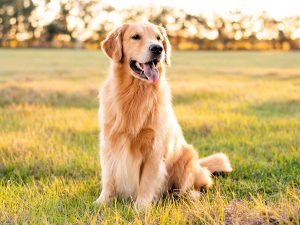
This is the term for a Labrador, or Lab as they’re affectionately known, and is consistently one of the most popular dog breeds across the western world because of its affectionate, placid, and trainable nature.
These characteristics make them incredibly versatile and they’re as adept at being working dogs as they are family pets. Their high intelligence combined with their kind temperament makes them great seeing eye dogs as well as working dogs with the armed forces. As the Retriever part of their name suggest, they’re great at retrieving things whether that’s game hunting or partaking in flyball and it’s not uncommon to see a Labrador out with their family carrying a prized stick back in their mouths.
Classed a medium size dog, they have a short coat that comes in black, yellow or chocolate that requires little maintenance. With a healthy lifestyle they can live up to 15 years and although they can be predisposed to hip and elbow dysplasia, they’re not as prone to health conditions as some breeds.
Cockapoo
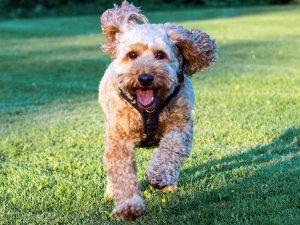
The Cockapoo is a cross breed dog and typically comes from the Cocker Spaniel and Poodle. Throughout lockdown, it was one of the most expensive puppy breeds and saw one of the largest price increases with the average cost of one of these puppies being almost £2,500. Given they were originally bred as a companion dog, it’s not hard to see why their popularity surged further throughout the pandemic.
This popular cross breed has the intelligence and trainability of their Poodle parent and the energy levels and play drive of their Spaniel parent. They’re very friendly with adults, kids and other pets (even cats!) and they’re an especially popular choice for those with low tolerance to dog hair. Their Poodle parentage means they’re relatively low shedding and their coat is easy to maintain.
Whilst they’re easy going, they are pack dogs and don’t tolerate being left alone for long periods of time. They’ll be inclined to bark at anyone who gets too close to their territory and can ‘cry’ if they’re left alone for long periods of time. Like all dogs with a higher proclivity towards intelligence, they can become destructive if bored so make sure you’ve got lots of time and attention if you’re going to bring one of these little balls of character home.
French Bulldog
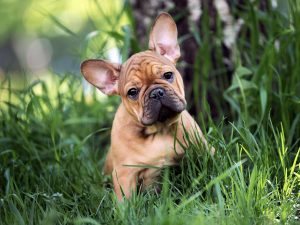
This breed was the definition of Parisian chic at the turn of the last century and 100 years later, it’s seen another meteoric rise in popularity. According to the Kennel Club, the French Bulldog saw registrations increase 10 fold between 2009 and 2015 and anyone who has been near any social media platform recently wouldn’t be surprised to hear it’s the third most popular breed in the UK.
Despite their name, this breed originated in England but as they were bred as companion dogs, they accompanied their East Midlands lacemaker owners across the Channel during the industrial revolution. Their recent resurgence can be attributed to their easy-going nature and compact size which makes them better suited to urban living than some dogs.
They do need daily exercise but they don’t need the hours of long walks some larger breeds need. They do tend to have a very playful nature though and can channel their energy into being destructive if not properly trained.
Unfortunately, like all brachycephalic dogs, their flat face and small head can make them more predisposed to certain health conditions, especially if they’ve come from an unscrupulous breeder. Dogs with shorter heads can experience breathing problems and are especially susceptible in hotter weather. They can often have too much soft palate which can lead to their airway becoming obstructed, this is why it’s common to see Frenchies (and other flat faced dogs like pugs) panting and snuffling and it’s why many of them are loud snorers.
Cocker Spaniel
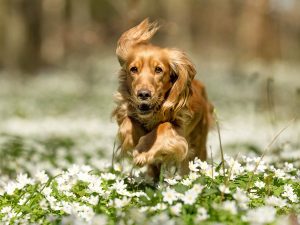
Although this affectionate breed originated as a hard-working gundog, you’ll find most Cocker Spaniels in the UK living life as beloved family pets. With the word Spaniel meaning Spanish Dog, this breed originated in Europe but has been happily at home in the UK for over 100 years now.
They combine many of the most ideal qualities looked for in a faithful family pet; their small size makes them ideal for living in smaller homes or even flats but they do prefer access to a well fenced-in garden. Their eager to please personalities mean they’re easy to train and their docile nature makes them very child friendly. They love nothing more than running and playing and accompanying their owners on a nice long walk in the country where they can go exploring but when they’re tuckered out at the end of the day, they’ll snuggle up with their beloved family.
Whilst their personalities are low maintenance, their coats are not. They need a lot of grooming to keep their long, sleek coats healthy. One of the most distinctive physical characteristics of the Cocker is their amazing long ears but these can be prone to health problems too. Make sure you’re checking their ears every few days, make sure they’re free from any infections on the inside and they’re not picking up any seeds or anything that could embed into their fur on the outside.
Dachshund
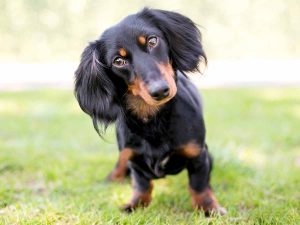
The Dachshund or Sausage Dog was originally bred to hunt burrow dwelling animals like rabbits for which their long body and short legs are perfect. This popular breed can come in the more widely recognised short, smooth coat as well as a long, glossy coat and a wire hair coat. But they all have the same distinctive longer body with large front paws and a deep chest.
Whilst it’s common for Dachshunds to be very playful and friendly, they can also be incredibly stubborn which means they need strong training from a young age. Like many intelligent dog breeds, they tend to question what’s in it for them when given a command and as a result, they’ll often develop very strong bonds with their owners who spend a lot of time and attention with them. This means they can be sceptical of strangers and it’s not uncommon for Dachshunds to bark or even growl if they feel they need to protect themselves or their pack. Given their ancestors quite frequently took on badgers when out hunting, they don’t let their size hold them back.
Always check out insurance options on Dachshund to be safe.
As with many popular pure breed dogs these days, there are breeders who will take advantage by not following proper breeding guidelines so always do your research. Unfortunately, years of selective breeding have elongated their bodies which can often lead to back problems. Intervertebral Disc Disease can be brought on by environmental factors as well as hereditary genetics. Never let your Dachshund jump on and off furniture and always support the front and back of the body if you’re carrying them.
However, if they suffer an illness or injury, it can also be both stressful and expensive. British Pet Insurance Services can provide the support you and your dog need, whether it is with your dog insurance cover, making a claim or just helpful advice along the way.
Get a quote